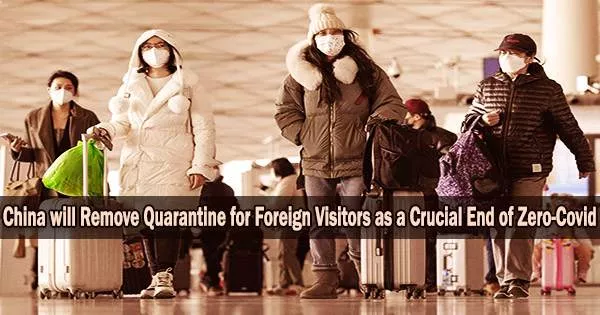China said late on Monday that beginning on January 8, visitors entering the mainland will no longer need to undergo quarantine.
The upcoming change comes after this month’s unexpected relaxation of domestic Covid regulations. The majority of the most stringent restrictions that China has enacted under its zero-Covid policy for almost three years come to an end as a result of the modifications.
Since March 2020, visitors to the mainland have been required to quarantine, usually for 14 days at a certain hotel. Before China started shortening quarantine times this summer, that length of isolation for some foreigners started to climb to 21 days or more.
The current protocol calls for a five-day quarantine at a central location, followed by three days spent at home.
Additionally, according to China’s National Health Commission, beginning of January 8 the government will stop monitoring the close relationships of Covid patients, stop designating places as Covid risk areas, and end Covid measures that had impeded the entry of commodities.
According to the commission, visitors to China will no longer need to apply for a clean health code and will simply need to present results of recent viral tests that were negative. The statement stated that passengers would still need to wear a face mask during the flight.
China’s economy slowed this year as a result of strict Covid controls that effectively shut down Shanghai and other regions of the nation for almost two months. Earlier this month, Beijing abruptly lifted several of the prohibitions. Local Covid infections also increased, placing further strain on the already overburdened public health system.
More flights needed
It has been challenging for international companies doing business in China to hire employees, executives, and factory technicians because of the inbound quarantine requirement and other Covid-related restrictions.
“Just because the borders are open doesn’t mean travel will bounce back immediately,” Michael Hart, president of the American Chamber of Commerce in China, said last week.
He noted the number of available flights in and out of China has to recover. “I don’t think the U.S. carriers or the international carriers will immediately go back to normal because those airplanes are already flying other routes,” Hart said. “It may be different with Chinese airlines, because the airplanes are just sitting on the tarmac doing nothing.”
China estimated that 670 million people traveled internationally in and out of the country in 2019. According to the National Immigration Administration, it fell to 128 million in 2021.
China announced on Monday that it will simplify the process for obtaining a visa to enter the nation to resume job, business, study, visit relatives, and other activities.
Chinese citizens’ ability to travel overseas will be “resumed in an orderly manner,” the announcement said in Chinese, according to a CNBC translation.
Beijing prohibited Chinese nationals from obtaining passports or leaving the country during the pandemic unless they had a specific, often business-related objective.
Before, businesses in many foreign tourist destinations relied heavily on Chinese travelers and their overseas spending, especially on luxury products.
















